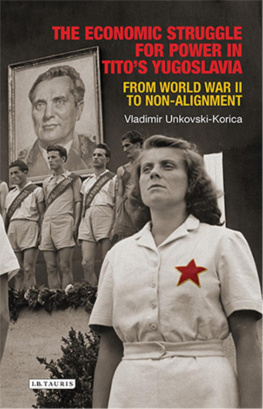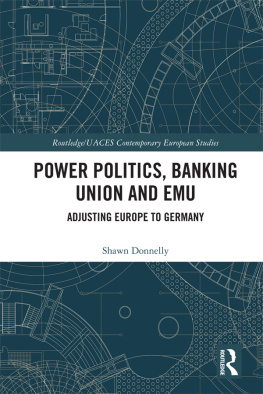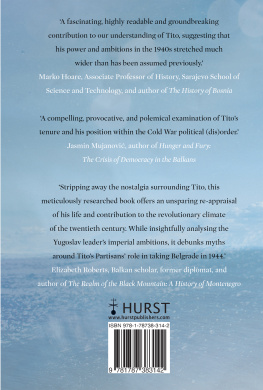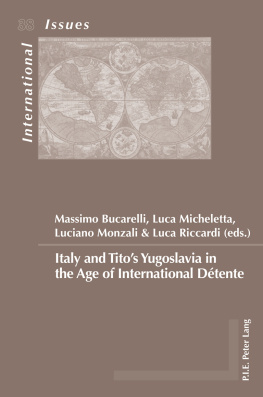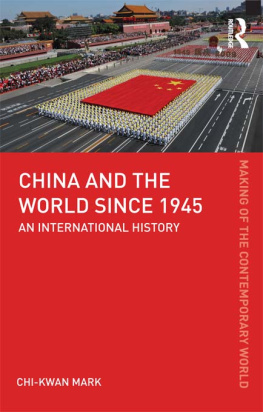Vladimir Unkovski-Korica is Lecturer in Central and East European Studies at the School of Social and Political Sciences, University of Glasgow. He completed his MSc in Russian and Eastern European Studies at Oxford University and his PhD at the London School of Economics and Political Science (LSE), where he taught for several years. He was also Assistant Professor at the National Research University Higher School of Economics, Moscow.
Based on research into previously rarely used primary sources, Dr Unkovski-Koricas book makes at least two important contributions to the existing literature on Yugoslavia. First, it re-examines the development of once idealized, then maligned and forgotten, and now re-discovered, but always somewhat misunderstood, Yugoslav road to socialism. Second, it situates the origins of Yugoslavias break-up in an earlier period than other relevant studies have done (1950s60s) and in another arena (economic policies and rivalries). The author is to be commended for presenting his arguments free of determinism, characteristic of many post-Yugoslav works. Rich in information, relevant for anyone interested in Titos Yugoslavia, Eastern Europe and Communism, and recommended.
Dejan Djoki, Reader in History, Goldsmiths, University of London
This is a necessary story but here it is also very well told. There is a clear argument, that everything that happened in the 1970s and 1980s had its origins in the debates and crises of the 1950s and early 1960s. In the struggle to reform Communism and survive Stalins blockade, the country opened increasingly to the world market, which caused trouble on the shop floor; Tito then sought a compromise but as the author states, with the failure of this compromise, by the mid 1960s, the way was open for the popular revival of the national question and the ultimate collapse of the Yugoslav state.
Geoffrey Swain, Alec Nove Chair in Russian and East European Studies, University of Glasgow and the author of Tito: A Biography (I.B.Tauris, 2010)
To my mother, Sneana Korica, and my father, Dimitrije Unkovski,
in love and gratitude, for always being there,
and for teaching me the value of critical thinking and
the struggle for social justice.
Published in 2016 by
I.B.Tauris & Co. Ltd
London New York
www.ibtauris.com
The right of Vladimir Unkovski-Korica to be identified as the author of this work has been asserted by the author in accordance with the Copyright, Designs and Patents Act 1988.
All rights reserved. Except for brief quotations in a review, this book, or any part thereof, may not be reproduced, stored in or introduced into a retrieval system, or transmitted, in any form or by any means, electronic, mechanical, photocopying, recording or otherwise, without the prior written permission of the publisher.
References to websites were correct at the time of writing.
Library of Balkan Studies 5
ISBN: 978 1 78076 328 6
eISBN: 978 1 78672 031 3
ePDF: 978 1 78673 031 2
A full CIP record for this book is available from the British Library
A full CIP record is available from the Library of Congress
Library of Congress Catalog Card Number: available
ACKNOWLEDGEMENTS
The debts incurred while writing a doctoral thesis and then turning it into a book are always many. Writing about Yugoslavia for me particularly involved a constant struggle to re-think both my roots and my approach to history. Yugoslavia collapsed while I was still very young and returning to its history felt all too often like a personal odyssey. Nonetheless, I felt the task was important as many works have been written about its end, at the expense of earlier periods in its history. Providing an explanation for how the Titoist system in Yugoslavia evolved from uncertain beginnings in World War II, through an ostensibly prosperous and calm period, before going into deep crisis, proved to be a challenge. I hope I succeeded in attaining a high level of detachment and critical spirit.
If I did, this would in no small measure be down to my supervisor, Anita J. Pra#x017C;mowska. Her support began when, as an undergraduate student of law at the London School of Economics and Political Science, I enrolled on her third-year course on the Russian Revolution. This was my only outside option, but my irreverent classmates and my brilliant teacher, as well as the excitement of the topic itself, convinced me to pursue postgraduate studies in history. The following year, I completed an MSc in Russian and Eastern European Studies at the University of Oxford. Richard Crampton expertly mentored my thesis on Kardelj. I then returned to the LSE to undertake a PhD under Anitas supervision. Her guidance was always inspired, witty, careful and caring. I grew as a person and an academic, and whatever qualities this work may have are a testament to her intellect and integrity.
I should acknowledge the kind support given to me over the years by my colleagues at the LSEapos;s Department of International History, as a doctoral student and later as a fellow. The Postgraduate seminar series and the Cold War History seminar shaped me and I am grateful for the camaraderie and intellectual stimulation afforded by all those who attended. My first-year upgrade examiners, Robert Boyce and Arne Westad, gave me valuable comments and remained important interlocutors, as did Svetozar Rajak, whose help, especially in the shaping of the project and help with navigating archives in Serbia, proved tremendous. Sue Onslows sharpness and brightness was a constant source of cheer. Many colleagues provided me with help, advice, and friendship: Roham Alvandi, Nigel Ashton, Dayna Barnes, Robbie Barnes, Aur#x00E9;lie Basha-i-Novosejt, Antony Best, Matthew Betts, Nayna Bhatti, Victor Figueroa Clark, Michele di Donato, Milana Fomina, Marvin Fried, Demetra Frini, Tanya Harmer, Janet Hartley, Matthew Hinds, Alessandro Iandolo, Heather Jones, Artemy Kalinovsky, Paul Keenan, Dominic Lieven, Piers Ludlow, Andrea Mason, Emmanuel Mourlon-Druol, Snke Neitzel, Rui Lopes, Emma Peplow, Angela Romano, Taylor Sherman, Elizabeth Shlala, Alan Sked, Kristina Spohr, David Stevenson, Paul Stock, Natasha Telepneva and Wes Ullrich. Special thanks to all my students, especially of historiography, you were an extra motivation.
The bulk of the book was written during my year in Moscow, where I was Assistant Professor in History at the School of Historic Sciences of the Faculty of Humanities, National Research University Higher School of Economics, in 201415. Alexander B. Kamenskii was generous with his support time-wise and I will always be grateful for it. Elena S. Korchmina was a colleague to wish for, and I learned so much from teaching economic history with her. Martin Beisswenger and Liudmila G. Novikova were intellectual guides through Russian history and contemporary Moscow, as was Andrey A. Iserov. My colleagues and friends in the International Faculty Support Unit were always a smiling presence. Veronika Skuridina, Konstantin S. Petrov, Bora Erdamar and Emre Dogan provided friendship when it was most needed. I am lucky to have spent time with colleagues like Franziska Exeler, Jacob Feygin and Kristy Ironside, and I am especially lucky to have received their comments in a workshop organised around my book by Andrej Krikovi.
Special thanks are due also to librarians and archivists in several libraries and archives, in particular the Archives of Yugoslavia, the Croatian State Archives and the Archives of the Republic of Slovenia. The LSE generously funded several of my research and conference trips. Ljubodrag Dimi and Todor Kulji in Belgrade, Tvrtko Jakovina in Zagreb and Boo Repe in Ljubljana pointed me in important directions. Monica Priante, Franko Dota, Slaven Crni, Nikola Vukobratovi and Ana Simunda were always happy hosts to have in Zagreb. The colleagues of the Institute for Contemporary History and the Institute for Recent History of Serbia, both in Belgrade, were always there when needed. Special mention ought to be made of the help and support of the late Olivera Milosavljevi. Not only was Olivera always ready to meet me and discuss, sparing no criticism. Having completed a doctorate on a very similar topic to the one I had set out to write, in the 1980s, Olivera also crucially made available many documents now apparently lost. My thesis and my book would have been impossible without her. I always looked forward to her review of it. I was shocked and saddened to hear of her death in October 2015. Her untimely passing was a loss for our profession and for progressive thought in Serbia.

